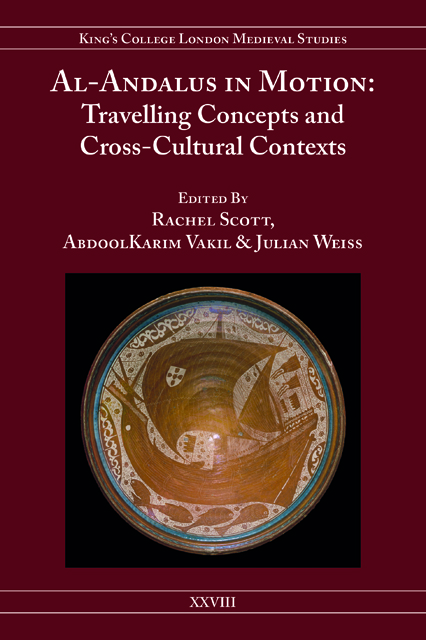Book contents
- Frontmatter
- Contents
- List of Illustrations
- Acknowledgements
- Notes on Contributors
- Part I Departure Points
- Part II Translating Al-Andalus: Travelling across Languages
- Part III (Re)Visions of Al-Andalus in Diaspora and Exile
- Part IV Andalusi Space as Node and Utopia: Europe, Islam, Empire
- Part V Al-Andalus and the Politics of Religious Identity
- Part VI Legacies, Landscapes and ‘Travel Buildings’
- Epilogue
- Index
8 - Al-Andalus on the Mind: The Jewish Golden Age and the Spanish Inquisition in Nineteenth-Century American Jewish Historical Writing
Published online by Cambridge University Press: 02 June 2023
- Frontmatter
- Contents
- List of Illustrations
- Acknowledgements
- Notes on Contributors
- Part I Departure Points
- Part II Translating Al-Andalus: Travelling across Languages
- Part III (Re)Visions of Al-Andalus in Diaspora and Exile
- Part IV Andalusi Space as Node and Utopia: Europe, Islam, Empire
- Part V Al-Andalus and the Politics of Religious Identity
- Part VI Legacies, Landscapes and ‘Travel Buildings’
- Epilogue
- Index
Summary
In a seminal 1989 article, historian Ismar Schorsch draws attention to the central role al-Andalus played in nineteenth-century German Jewish life. German Jewish intellectuals, Schorsch argues, hailed the Jewish life of al-Andalus as a Jewish ‘Golden Age’, a model for European Jews of their own time (1989: 47–66, especially pp. 48–49). Just as the Jews of al-Andalus had been integrated into the broader society in which they lived, they argued, so too modern European Jews ought to strive to participate in European society and contribute to its arts and culture. The tolerance of al-Andalus was contrasted with the persecutions endured by Jews in medieval Christendom, which were seen as having culturally isolated them, prompting them to turn inward. The persecutions of Jews across medieval Christendom thus accounted for what practitioners of Wissenschaft des Judentums, the discipline of scientific study of Judaism founded by German Jews, saw as the ‘backward’ state of much of the Jewish nation in the nineteenth and early twentieth centuries, when they lived and wrote. In addition to heralding al-Andalus as a model for Jewish readers, then, these same writers cast al-Andalus as a model for German society more broadly, one in which multi-confessional co-existence allowed for unprecedented cultural and economic effervescence; and in which Jewish emancipation, delayed and enacted piecemeal in the various German lands between 1808 and the 1880s, would be the surest path to the political establishment's agenda of culturally assimilating its Jewish subjects.
Since Schorsch, a number of historians have explored the way in which the history of al-Andalus has been used by European Jewish historians and thinkers. The historian of German Jewry, Carsten Schapkow, goes so far as to posit that many German Jewish intellectuals cast themselves as the direct heirs to the Jews of al-Andalus, ‘masking or completely ignoring’ their Ashkenazi heritage (2016: 13). Other scholars, such as Bernard Lewis and Mark Cohen, have noted the persistence of this idealisation of al-Andalus in post-Second World War writings on Jewish history in Israel and America (Lewis 1984: chapter 1; Cohen 1994: 3–5). In North American Jewish culture today, Jewish life in al-Andalus is frequently idealised in the vein of Wissenschaft des Judentums as well as held up as a model for contemporary Muslim-Jewish relations.
- Type
- Chapter
- Information
- Al-Andalus in MotionTravelling Concepts and Cross-Cultural Contexts, pp. 207 - 226Publisher: Boydell & BrewerPrint publication year: 2021



